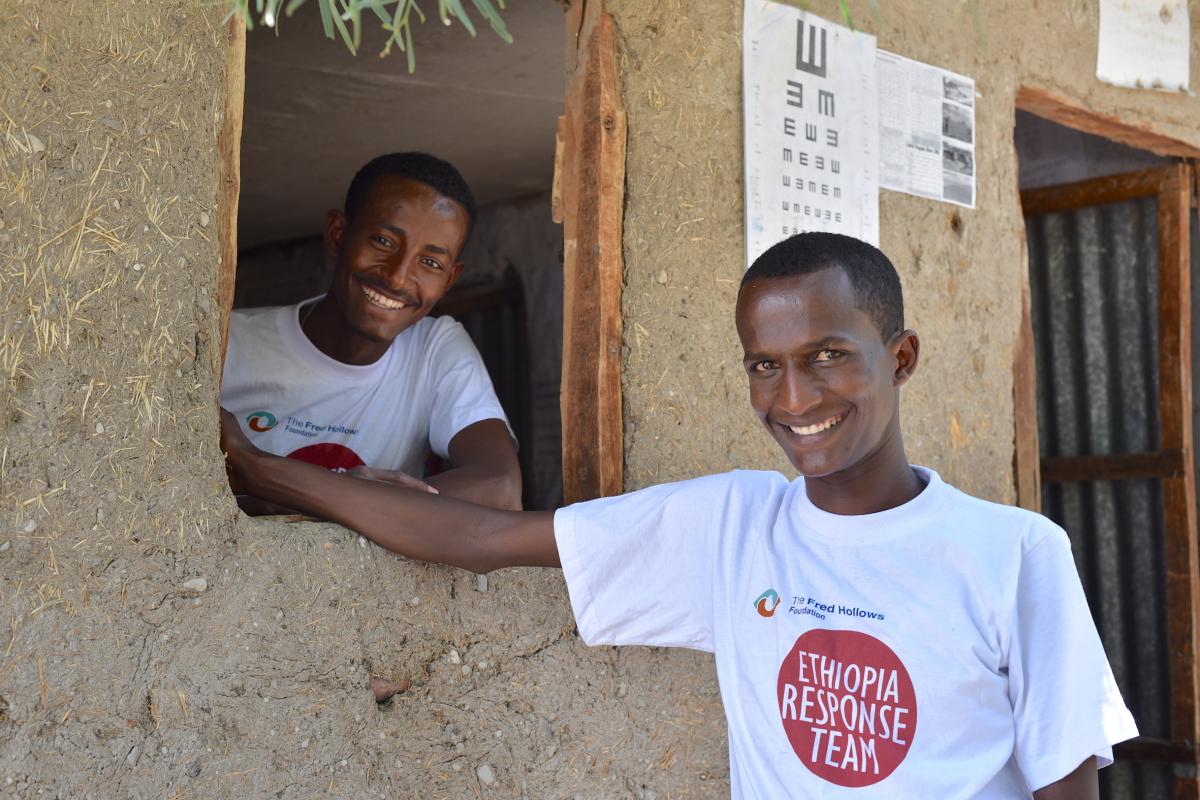Join a powerful, unprecedented alliance for better eye health for all.
Join IAPB-
Choose an alternate language here
For Africa Day, Matthew Smeal, Content Manager, The Fred Hollows Foundation recalls a recent trip to Oromia Province in Ethiopia documenting the work of their teams working to screen for trachoma and surgically treat trachiasis.

Large grey rocks blanket the road and surrounding area, creating a barren, moonlike landscape. It is basalt, left over from volcanic eruptions more than 20 million years ago – a stark reminder of the ancient and harsh land that is Ethiopia; and a fitting backdrop to the dry and dusty story of trachoma and its painful conclusion: trichiasis.
We are in Oromia province, outside the town of Fiche, about three hours’ drive north of Addis Ababa. Despite the inhospitable landscape, smoke rises from cooking fires revealing encampments and small villages. They are perched perilously on the steep sides of a valley cut millennia ago by a tributary of the Blue Nile. The people here live in immense poverty and trachoma is rife.
Temesgen Hailu is an eye health nurse trained by The Fred Hollows Foundation to perform Trachomatous Trichiasis (TT) surgery. For him, there is one predominant reason for the high prevalence of trachoma in the region: “There is not a lot of water [for face washing and personal hygiene]. To reach water people have to travel a long way,” he said. “Also the topography is at a high altitude so it is hard to reach water. If there is no water, no toilet in the house, no facilities, it can affect prevalence.”
The remoteness of these villages creates a two-edged sword: it’s hard to establish effective health services and it’s equally hard – both physically and financially – for people to get out.
The simple solution is for small health teams to go in – two or three surgeons who venture into secluded villages for days at a time, screening, operating, and saving sight for many.
Temesgen and fellow TT surgeon Kebede Shebiru form one such remote team.
And the need for the teams, according to Temesgen, is simple. “If the surgeon does not come here, these people will become blind,” he said. Kebede explains further. “In my country, there is less infrastructure, there are places where vehicles cannot access so sometimes we have to walk – without food, without water – but that doesn’t affect our job because we are serving our community and we are happy about that.”
Kebede and Temesgen have performed nearly 6,000 TT surgeries between them over the past three years. That’s 6,000 people who can now see because of one team.
Such success has some awkward rewards.
“Sometimes people approach me in different places like markets and they hug me,” Kebede said. “I ask myself, ‘Did I do this?’ It makes me very happy.”
Temesgen has had similar experiences. “People at the market got down to my leg and kissed my hand. I become teary because the people are very happy when they see you,” he said.
“I am very, very grateful for the work I am doing for The Fred Hollows Foundation. It is satisfying because we know we are relieving someone from going deeper into poverty.”
As the world commemorates Africa Day, it is important to reflect on the work being done in Ethiopia, the country where representatives from 30 African nations met in 1963 to establish Africa Day and improve the living standards of those in member states.
Liked it? Today is Africa Day and we have loads of posts for you. Here are some: